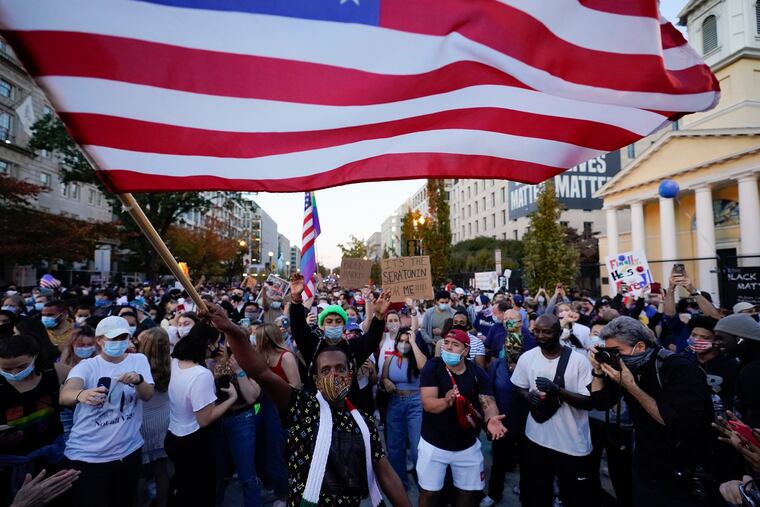Black Philadelphians who recall the 1960s assess race relations in a still-divided country
In a year that saw multiracial groups protesting racism and police shootings, nearly half the country's voters wanted to keep Trump in office.

They were children or teenagers the last time the country faced such a significant period of racial reckoning, when the civil rights struggles of the 1960s had police using fire hoses and police dogs on protesters.
This year was an echo of those turbulent times for many Black people. Multiracial coalitions took to the streets almost daily this summer to protest George Floyd’s killing by police. But also, the Black Lives Matter movement gained traction, with more organizations adopting its anti-racist platform. The events seemed to finally lay bare the systemic racism in this country and with it, a new willingness to acknowledge and address it.
And yet, in an election that was a referendum on President Donald Trump’s first term — on his racist rhetoric (“s—hole countries”), his policies that separate migrant children from their parents, and his downplaying a deadly pandemic that has disproportionately impacted people of color — nearly half the country’s voters wanted him to stay in office.
What does this say about race relations in this country? We asked three Black Philadelphians who witnessed the 1960s what they believe has changed, if anything, around issues of race since then.
Glenn Ellis, health educator and bioethicist
Glenn Ellis grew up in Birmingham, Ala., during the civil rights movement. Angela Davis lived just up the street from him. He knew the four girls killed at the 16th Street Baptist Church in 1963, and his Smithfield neighborhood was bombed so much, they called it “Bombingham.”
Now 66, the health educator and bioethicist who lives in Philadelphia is not surprised by the results of the election showing that, despite the protests over racism this summer, Trump received so much support.
“I was a toddler when Emmett Till got killed, and that’s been a continuing pattern all my life, through Michael Brown, Eric Garner," Ellis said. “None of this has changed things. We just keep kicking the can down the road.”
Following the protests of the 1960s, Ellis said, Black people and other activists were lulled into thinking that racism had disappeared. “We just fooled ourselves into thinking because Lyndon Johnson signed the civil rights bill that the racists went away.”
Although he doesn’t think much as changed, he does see one difference between now and then: a lack of optimism.
» READ MORE: For this writer, Alabama Senate race summons ghosts of Birmingham church bombing
Despite the Black people who had been lynched before he was born, despite drinking from a “colored” water fountain and having to sit in the crowded back of buses even when it was empty up front, Ellis said, somehow, the adults in his community “still made sure they infused us with hope.”
“We lost consideration and consciousness of the things that have sustained Black people since we were put on those [slave] ships," Ellis said. "We got enough of our own blame for this thing.”
Faye Anderson, historic preservationist, founder of All That Philly Jazz
Faye Anderson, a Philadelphia resident who is known for her website on the history of Philadelphia jazz and her watchdog activism about Black historic spaces, watched the 2020 election process with particular interest.
As writer and producer of the documentary, “Counting on Democracy,” about the 2000 presidential election controversy over Florida recounts, she recognized similar warnings being played out.
“The lesson learned from Florida is to count every vote,” Anderson said. Looking at this election, there are more lessons to learn. What does it mean that exit polls showed 58% of the country’s white votes went to Trump?
“White privilege is a hell of a drug," she said. “Why would one voluntarily give up that power? All of this talk about Black Lives Matter and systemic racism. It was all rhetoric. It was all the illusion of inclusion.”
She does not believe the country really has advanced since Black people were enslaved. Even though it was just a small minority of white people who enslaved Black people — “the equivalent of the 1 percent” — poor white folks still could have authority over Black people, she said.
And just as Black people look at their ancestors' struggles and gain strength from their resilience, she believes white men under 30, more than half of whom voted for Trump, look back at the power their grandparents once had over Black people.
“They want to hold onto whiteness as long as they can,” Anderson said.
Karen Warrington, African American cultural nationalist
In the 1960s, Karen Warrington danced with the Arthur Hall Afro-American Dance Ensemble. These days, the retired spokeswoman for former U.S. Rep. Bob Brady lives in North Philadelphia.
Over America’s history, she said, the blatant racism and sexism that has been part of the country has, at times, been tamped down, but it’s never gone away.
“Trump understood this flaw in the country’s story and was able to reignite what had never been truly extinguished,” both when he first won the White House, and now, when he came so close to being reelected, she said.
“The founding of the nation and its economic base are built on the fault line of slavery and the taking of the land from Native Americans,” Warrington said. “But instead of a recognition of and an atonement for these crimes against humanity, America has constructed a dishonest narrative that dismisses its true history.”
She said the nation can only realize its dream of equality if it is willing to confront its past and make this “truly a time of reckoning.”